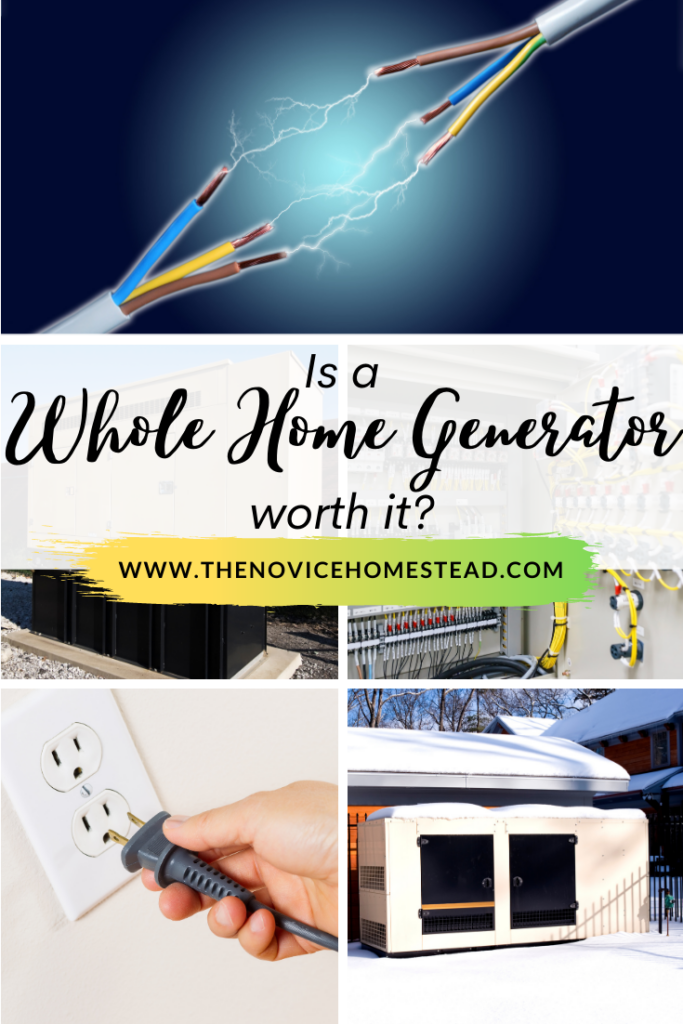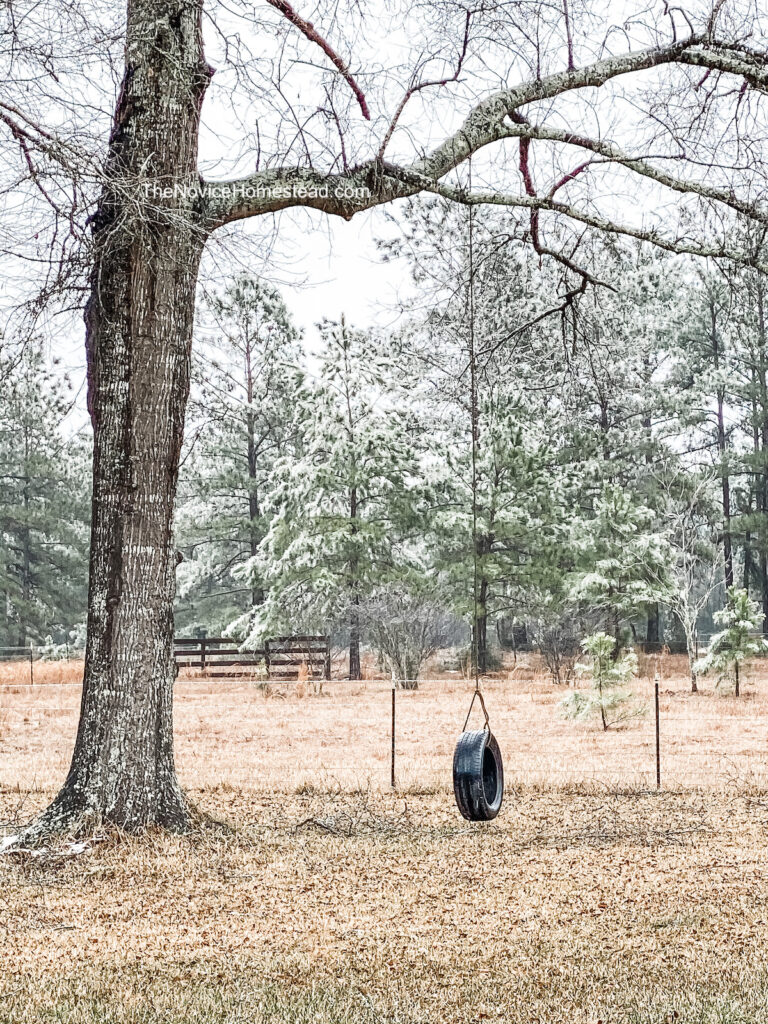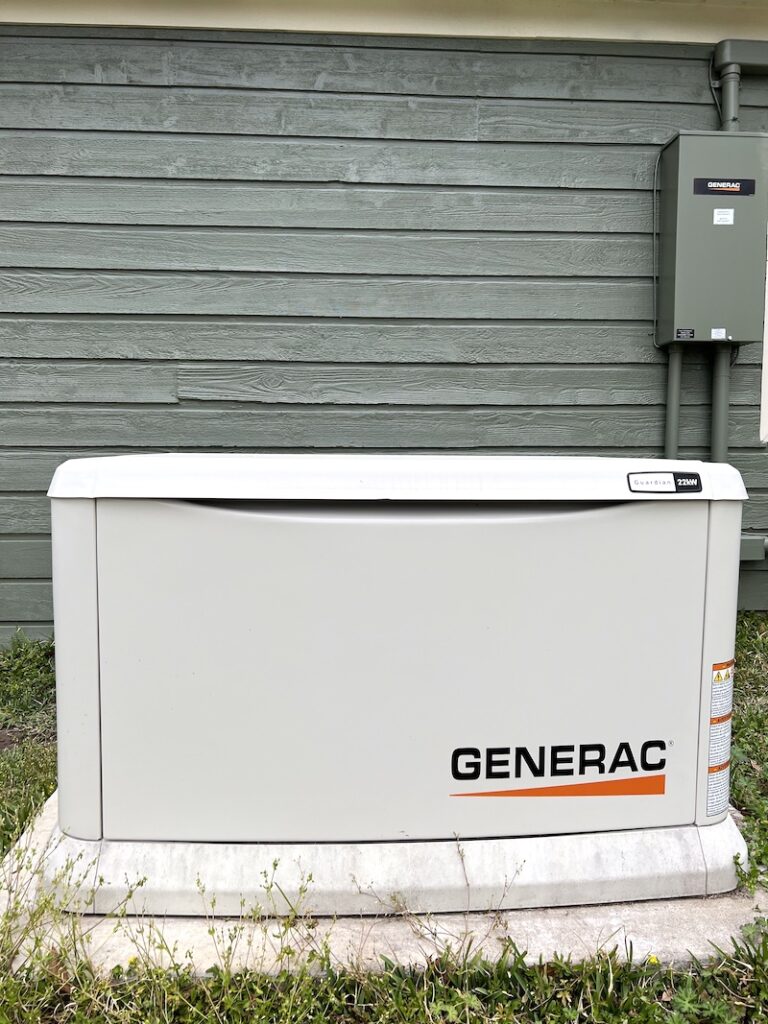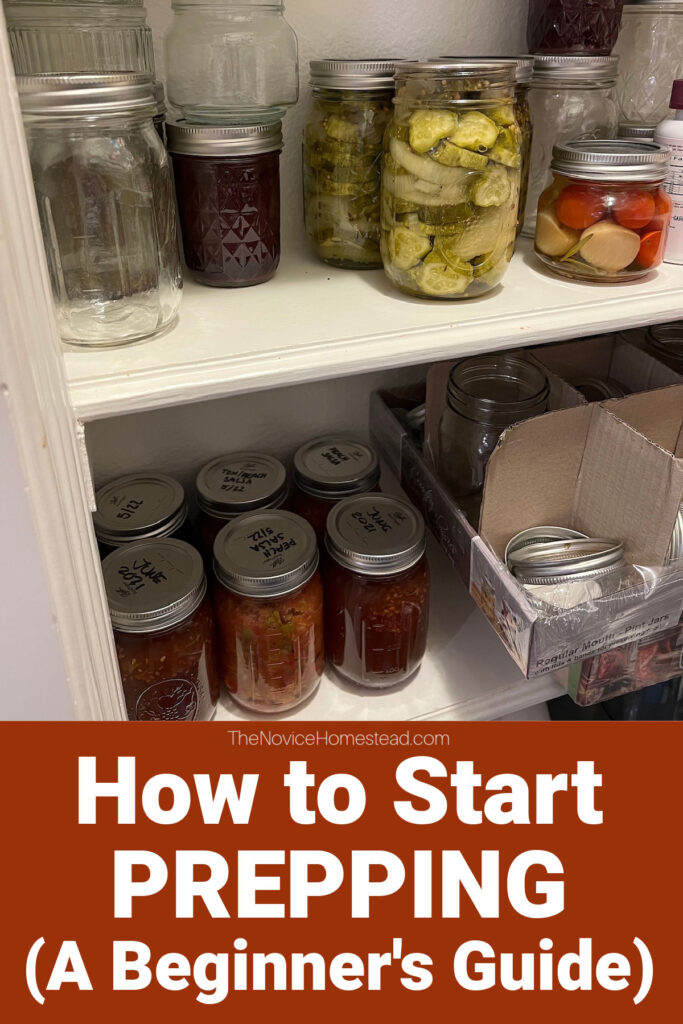Thinking about purchasing a whole home, or standby generator, but wondering if it is worth the cost? Learn about the pros and cons of a standby generator vs. a portable generator.

Also known as a “standby generator,” a whole home generator is a system to provide backup power to your home when there is a service interruption.
When the power goes out, say for a storm, the system sense the outage. The generator turns on and begins powering your home.
Why We Invested in a Standby Generator
First, I want to make it clear that this post is NOT sponsored in any way. A standby generator is an investment, and I had a lot of questions when we purchased ours. I decided to write this guide to share some of what I learned along the way, and how it has worked out for our family.
When we first moved into our new home and acreage, we found out right away how important a generator can be when you live in an area with storms.
Just a couple weeks after settling in, our area was hit by a tropical storm. We lost power for a full day. At the same time, our street was flooded, so we were not able to leave our property.
Fortunately, power was restored after a day and we were prepared enough for that. However, it was a wake-up call that we needed to plan for extended power outages.
Fast-forward a year and Texas gets hit with the most extreme winter storm in recent history. Temperatures plummeted to the single digits…almost 0 degrees where we lived. The temperature did not get above freezing for several days and our area was also hit with an ice storm.
The ice caused down power lines and the extended cold brought down the Texas electrical grid. Our generator allowed us to keep the heater on (though we kept it at a low setting) and it also kept our pipes from freezing.
The Texas winter storm of 2021 was devastating for our area. Hundreds of people died (both due to the cold and due to carbon monoxide poisoning). There was billions of dollars of damage — I know so many friends and family who suffered broken pipes and water damage.
A whole home generator kept our home protected and our family (and kids) safe during a weather emergency. That once instance alone made it worth it for us.

Here are a few situations where a generator can be extremely useful:
- In the event of a storm, you may be unable to leave your home to restock supplies or for any reason. A generator can keep your fridge/freezer on to preserve food stores as well as keeping running water going (see below).
- If you have an electric well pump or septic system, a power outage means those systems do not run. An extended outage can leave you without running water or a way to dispose of toilet waste. That can quickly become a major issue.
- During a freeze, an extended power outage can become dangerous, especially in areas that don’t usually experience extreme cold (such as here in Texas).
- During a tropical weather event, such as a hurricane, the extreme humidity can cause mold in the home if there is no air circulation.
- If you have medical equipment (such as an oxygen machine) that requires electricity, an extended power outage can be life-threatening.

How Much Does a Standby Generator Cost?
The cost of your generator will depend on your power needs, mainly the size of your home and how many things you want to power when you lose electricity.
$10,000 is a good starting point for budgeting — when you meet with a professional dealer, they will be able to give you a more specific price based on your needs.
For example, if you’re only planning to power up certain necessities, a small standby generator might run in the $2000-4000 range.
However, if you have a large home and/or want to power the entire home, you may be looking at 10k-20k.
Our house is just over 3000 square feet and due to the way our home is wired and the location of our breaker boxes, partial power was not a feasible option for our generator. Ours is set up to power the whole home, minus our smaller air conditioner/heater. The cost for this was just under $12,000.
You’ll also want to factor in yearly maintenance. Just like a car engine, a standby generator requires periodic oil changes and battery checks or replacements. Some manufacturer warranties require service to be performed by a licensed professional, to stay under warranty.
Overall, a standby generator is a big investment. However, when you live in a place that is prone to natural disasters (like hurricanes that we deal with on the Gulf Coast), this is something that can truly be life-saving. And you can’t put a price on life.
Where Does a Standby Generator Get its Power?
Your generator will be powered by natural gas: either from your natural gas provider or your propane tank. Unlike a portable generator, standby generators do not use gasoline and do not require manual refilling.
Because they are directly connected to your natural gas line or propane tank, standby generators run continuously as long as needed, and as long as fuel is available.
Because of this, fuel cost is another consideration when planning for the cost of your generator. If propane is $2/gallon and your generator uses half of your 500-gallon tank during an extended outage, the cost for running your generator during that time is $500.
Our Generac dealer told us that the generator could power our home for at least a week on a 500-gallon tank (which is actually only filled to 400 gallons).
As you can see, this is not a power source that you want to use long term. It is costly, and definitely for emergency situations where the alternative of having no power is worth the cost.
Standby Generator vs. Portable Generator
A whole home generator is expensive. Is it worth paying that much when you can get a portable generator for much less?
- Portable generators are generally less expensive than standby generators. However, a portable generator that you can buy at Lowe’s, Home Depot, etc. will only be able to power up a very limited amount of items.
- Standby generators are designed with weather protection, while portable generators are not supposed to be operated in the rain. This is especially an issue during a storm.
- Standby generators come on automatically when the power goes out, while a portable generator must be fueled up and connected every time you want to use it.
Are Generators Dangerous?
One of the main benefits of a standby generator, compared to a portable generator, is safety. Standby generators (when installed by a professional), are relatively safe.
All generators produce carbon monoxide gas, which is dangerous to inhale. When a professional installs your standby generator, there are rules about placement. The generator must be installed a certain distance from the house and from any windows, to prevent exhaust fumes from entering the home.
During the Texas freeze of 2021, the official death toll is listed as 246 (though the actual toll could be as high as 1000). Almost 10% of fatalities were caused by carbon monoxide poisoning, likely from improper generator use or other dangerous heat sources (cars running in garages, leaving a gas stove on, etc.)
Can You Install a Generator Yourself?
Yes, technically you could install your own standby generator. But unless you are a professional electrician with experience installing generators, this is not what I would recommend.
Most importantly, an improperly installed generator can be dangerous. Generators deal with electricity — a large amount of electricity. If something is wired wrong, it could be a fire hazard or even a risk of electrocution.
Another potential issue with a bad installation is that the placement of the generator could allow exhaust fumes to get into the home, either through a window or the HVAC system. Carbon monoxide is a deadly gas, so this is not something you want to “wing it” on.
Finally, if you ever try to sell your home and the generator was NOT installed correctly, your home may not pass inspection.
Is a Standby Generator Right for Me?
I know that I may open myself up to some flack from other homesteaders by using a whole home generator. And that’s ok. Your situation may allow you to get by without one or to use other backup power sources.
With small children and living in an area that has the bad combination of frequent natural disasters and an unreliable power grid, a generator was the best choice for our family. It already paid for itself in the first year alone.
I hope that this guide will help you to get a better idea of the benefits of a whole home generator, so you can decide if it’s what you need. Feel free to ask any questions you still have in the comments below!
You might also like:


How to Keep a Well from Freezing
